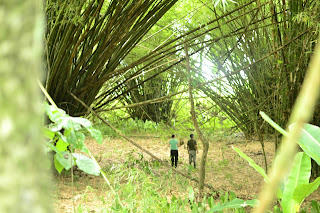 |
| Drinking cold beer in some hot springs - Costa Rica has lots of volcanoes and we basked in the warming effect of one of them in La Fortuna |
 |
| Going bananas for bananas - we loved seeing all the banana trees |
What we've found has been a mixed bag. There have been some really beautiful sections, in particular coming through the banana plantations, where hundreds and thousands of banana trees stretched out beside us. Costa Rican bananas account for a significant amount of the bananas that we eat in the UK, and so we found ourselves constantly accompanied by the familiar looking logos of Chiquita, Del Monte and Dole on the lorries that thundered by as we rode along the main route to the Caribbean port of Limon. There is something about the leaves of the trees that make the plantations really unique and whilst we were full of generous superlatives about their beauty, we can't say the same for the traffic which we muttered and grumbled about as we braced ourselves against the drag of each lorry passing uncomfortably close. Ali swears he will remember those lorries every time he eats a Chiquita banana - Lizzie is pretty sure that once the divine combination of banana and peanut butter melts in his mouth he'll be transported to a higher place and have no space for anguish.
 |
| A full complement of lorries - for all of your potassium needs |
 |
| Loading up - possibly for a transatlantic voyage to a Waitrose near you |
 |
| Rambutans modelling a relaxing decking |
 |
| In a bamboo clearing known as the 'Cathedral' with Raphael on his plantation |
Costa Rica is famed for its amazing wildlife, and we've not been disappointed. We did a night walk in the cloud forest where we saw all sorts of creepy crawlies (tarantulas, snakes, scorpions and salamanders) and visited a rescue sanctuary that was rehabilitating wounded animals (sloths, monkeys, caymans, more snakes - they've been somewhat of a theme here) but we've also been so lucky to see fantastic wildlife on the road. For example, comparing the amazing bright orange shelled and purple legged crabs from the Pacific Coast with the blue crabs on the Caribbean Coast. We've spotted a few toucans sailing past us and a particular brilliantly bright red chested bird that had a good swing at both of us as we pedaled past, clearly too close to his nest that he'd built in a road sign (I hope he wasn't taking the same approach to the lorries as I'm pretty sure I know who would win).
 |
| A sizeable guest that dropped in to reception in our hostel |
 |
| A fast moving crab that we inadvertently camped on in Nicoya |
 |
| Don King vs Ross Kemp |
We've got new tyres to greet us in Colombia and, having found a professional to help sort out Lizzie's gears, ride on into Panama (more or less) fully serviced, and ready for a long slog on the Panamerican Highway in search of a fabled canal.
No comments:
Post a Comment